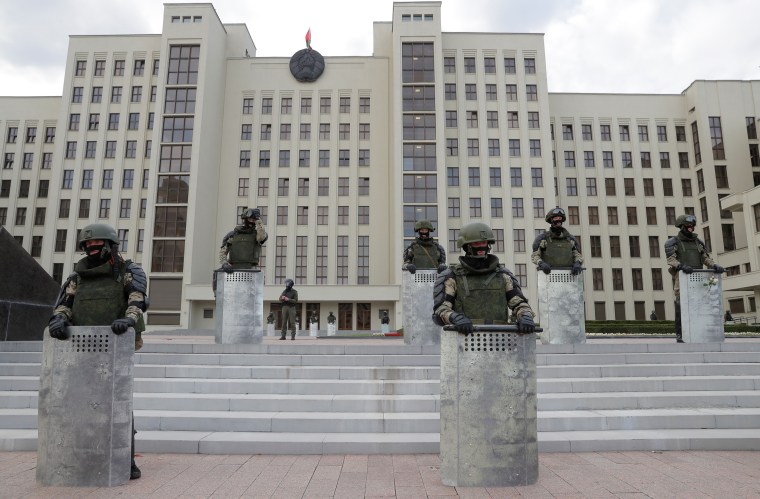Vilnius, Lithuania, March 17, 2021 — Belarusian authorities must stop prosecuting and harassing members of the press, and should allow reporters to cover issues of national significance without fear of reprisal, the Committee to Protect Journalists said today.
On March 12, officers of the KGB, the Belarusian security service, in the western city of Hrodna detained Dzianis Ivashyn, an investigative reporter at the Novy Chas newspaper, and searched his apartment, according to a report by the Belarusian Association of Journalists, a local advocacy and trade group, and news reports.
Authorities charged him with “interference with the activities of a law-enforcement officer,” according to another report by the association.
Volha Ivashyna, Dzianis’s wife, told the journalists’ association that officers confiscated phones, laptops, books, and business cards during the raid, and sought out anything in the Ukrainian language or related to Ukraine.
In early March, Ivashyn published an article alleging that former officers of the Ukrainian riot police unit Berkut, which was disbanded over brutality allegations in 2014, had been hired by the Belarusian police, and named some of those officers. Ivashina said her husband was placed in the Pretrial Detention Center No. 1 in Hrodna, and said he would be held there for at least two months.
“Belarusian authorities must immediately release reporter Dzianis Ivashyn and stop persecuting journalists for coverage that displeases the government of President Aleksandr Lukashenko,” said Gulnoza Said, CPJ’s Europe and Central Asia program coordinator, in New York. “Trials and detentions of members of the press must stop. Belarusian law enforcement officials should remember that they will be held accountable when Lukashenko is out of office.”
Today, a court in the eastern city of Vitsebsk convicted independent journalist Zmitser Kazakevich on charges of working as a journalist without proper accreditation, citing reports he filed about protests calling for the resignation of President Lukashenko for the Poland-based independent broadcaster Belsat TV, according to news reports and Volha Khvoin, head of the analysis and information service of the journalists’ association, who spoke to CPJ in a phone interview.
The court ordered Kazakevich, who has been free pending his trial, to pay a fine of 1,740 Belarusian rubles (US$669), Khovin said. CPJ could not immediately determine if he plans appeal the fine.
Separately, the Leninsky District Court in Hrodna held a hearing yesterday in the case of Aleksey Shota, chief editor of the independent news site Hrodna.life, on charges of distributing “extremist” materials, according to a report by the journalists’ association and Hrodna.life editor Irina Novik, who spoke to CPJ in a phone interview. The court adjourned without a verdict, and the next hearing is scheduled for March 19, she said.
Previously, on January 29, police searched the offices of Hrodna.life and confiscated reporting equipment, as well as calendars and magazines published by the outlet, according to that report.
Novik told CPJ that Shota is on trial because the logo of the Telegram channel NEXTA—a channel that covers protests, but which authorities have labeled an extremist organization—appeared in three articles by Hrodna.life; the logo was later removed.
If convicted, Shota, who is free pending trial, could face a fine of up to 14,500 Belarusian rubles (US$5,583), under the country’s administrative code.
CPJ is also investigating the case of Jan Roman, a correspondent for Polish satellite broadcaster Polsat, who police detained today at his home in Hrodna, according to a report by the Belarusian Association of Journalists. Police raided his apartment, seized his phone and laptop, and accused him of illegally funding demonstrations by helping two people pay administrative fines over their alleged participation in protests, according to that report.
He remains in detention, according to the journalists’ association. CPJ could not immediately determine whether he has been targeted in retaliation for his work.
The head of the Belarusian Association of Journalists, Andrei Bastunets, told CPJ via phone that the prosecution of Belarusian journalists is “a part of a broader attack on civil society.” He said at least 11 journalists are currently detained in the country.
CPJ called the Hrodna and Vitsebsk regional prosecutors’ offices, but officials who answered the calls refused to comment.
CPJ also called Volha Chemadanava, head of the press office of the Belarusian Ministry of Interior, for comment, but no one answered the call.
